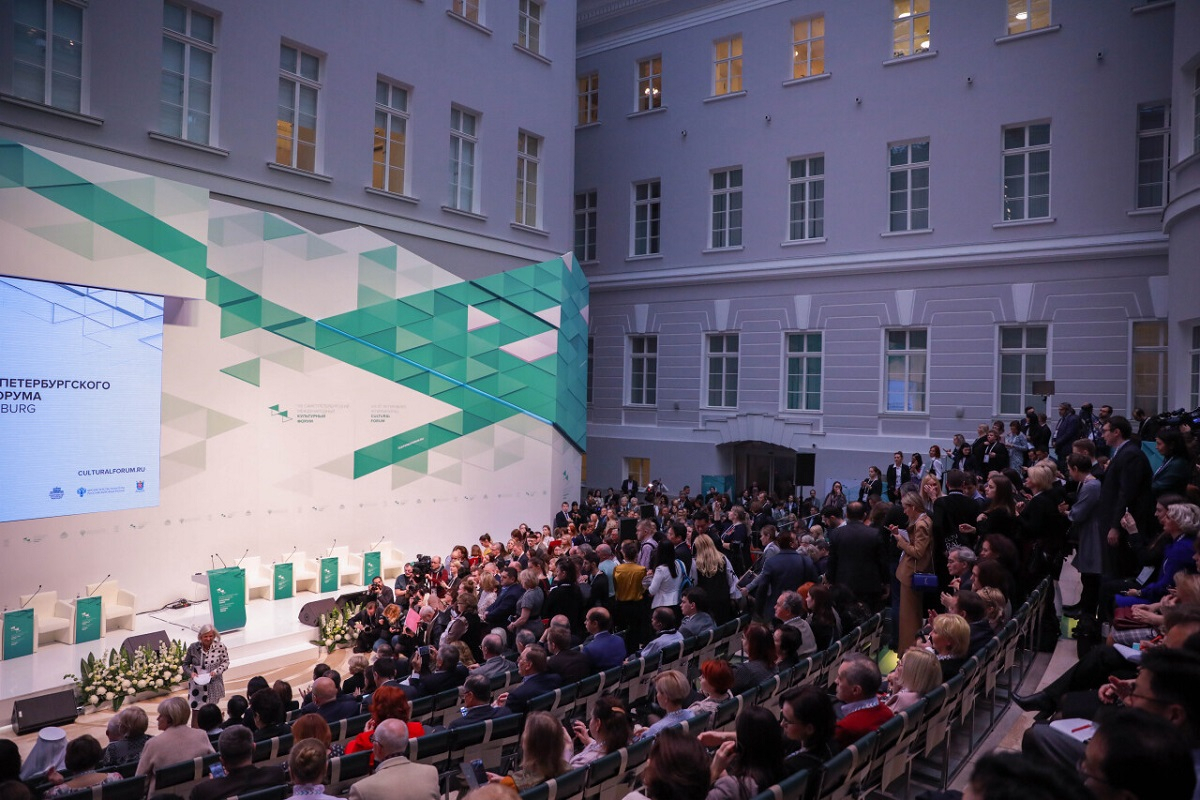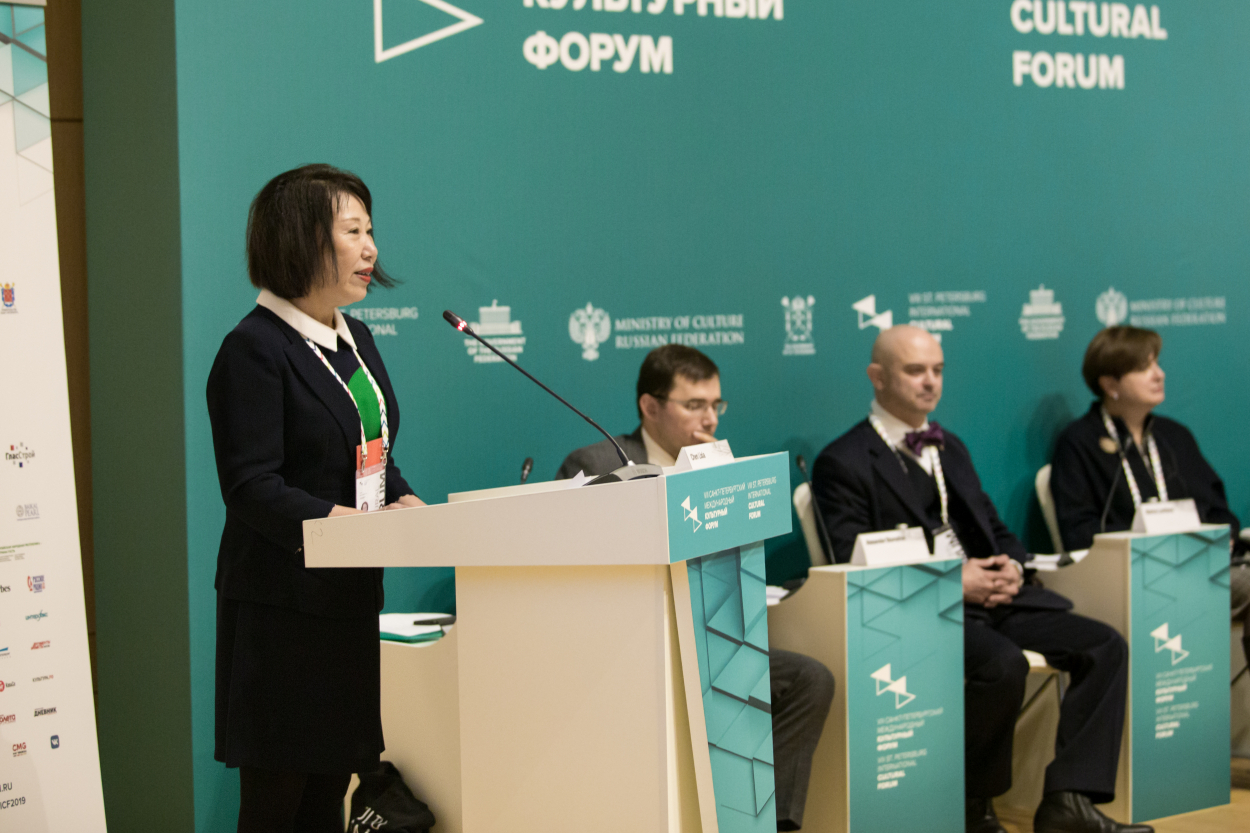St Petersburg University experts took part in the Cultural Forum
14–16 November 2019, St Petersburg hosted the VIII International Cultural Forum. This year, the Education section was led by the Rector of St Petersburg University Nikolay Kropachev. The section held 16 events, including: discussions in a variety of formats; conferences; workshops; stage performances; concerts; exhibitions; and book presentations. The Education section events were attended by over 130 experts from 20 countries, while the number of guests from the public exceeded 3,000.
Challenges of the present day
In 2019, the Honorary Status ‘Guest Country’ of the VIII St Petersburg International Cultural Forum was assigned to the People’s Republic of China. Several events organised by the Education section were included in the special programme presented by China at the Forum. Thus, one of the key events was the round table discussion ‘The Linguacultural Space of the Belt and Road Initiative (BRI): Challenges and Opportunities for Universities.’
During the discussion, representatives of the leading institutions of higher education in Russia and China discussed the prospects for mutual cooperation. These include projects in the field of language learning and the development of interdisciplinary research.
‘In teaching Chinese as a foreign language, it is wrong when the same teachers work with learners at different levels of the Chinese language competence,’ Liu Li, Rector of Beijing Language and Culture University, emphasised at the round table. ‘Today it is necessary to train teaching specialists for different levels. Moreover, both local teaching staff and specialists from China should be involved in this process. Together they will be able to improve the quality of teaching and to conduct research. This is the reason why cooperation with universities around the world should be our priority.’
Another key event on the Education section calendar was a panel discussion ‘The Concept of “Ecological Civilisation” as the Architectonics of Culture in the Future’. It was also included in the special programme of the Guest Country – China. Representatives of museums and universities from Russia, China and the USA debated the impact of the ecological civilisation concept on culture and our everyday life. Among other topics, the discussion questions included: human spatial architectonics (harmonious way of life); the legal aspects of ecological civilisation; and the preservation of cultural and historical heritage in the context of this concept.
One of the highlights of the Forum was the premiere of the play ‘To Kill the Emperor’ by Nobel laureate Mo Yan. The performance extends beyond the scope of a 2,000-year-old Chinese legend – it is a story about a man who needs to know himself and make an important decision.
Despite being far removed in time from the present, the central character of the play thinks like modern man. He is consumed by ambition and dreams of fame, he falls in love and does not want to die; while as a man adherent to Confucian principles, he must act in the name of duty, honour and for the sake of his master.
Iuliia Mylnikova, Creative Producer of the show, Director of the additional educational programme ‘Confucius Institute at St Petersburg University’
During the Forum, the gallery of the Twelve Collegia building hosted the exhibition ‘Modern Art of China: From Generation to Generation’ prepared by the Diaghilev Museum of Modern Art of St Petersburg University. The exhibition presented the works by Chinese contemporary artists from Hong Kong, Taiwan, Shanghai, and Beijing. They are members of different generations of artists with differing perspectives on the traditions of their country and include: Winnie Mak, Eddie Lui Fung Ngar, Liao Shiou-Ping, and Yang Yongliang.
‘Contemporary Chinese art is based on the 50-century philosophy of China. At the same time, it allows for the weaving of modern threads in the time-honoured traditions. The university is first and foremost an educational institution. Therefore, it is very important that our students should have the opportunity to familiarise themselves with this art. They should not just view a digital reproduction but be able to come close and see the work itself. This is an element of the educational framework. This is the educational environment of St Petersburg University,’ explained Elena Chernova, Senior Vice-Rector of St Petersburg University at the opening of the exhibition.
Preserving traditions
Another key event of the Education section was a panel discussion ‘Nabokov: Fragmentary Myths and Holistic Perception’. The discussion was dedicated to the 120th anniversary of Vladimir Nabokov. Alla Manilova, State Secretary and Deputy Minister of Culture of the Russian Federation, opened the discussion by remarking that the Nabokov archives might return to Russia. One of the conditions for the return of the archives, sought by the writer’s legal heirs, is that the Nabokov museum should be granted full federal status. Alla Manilova explained that as part of St Petersburg University, which is a Federal State Educational Institution, the Nabokov Museum already has the required status.
The Deputy Minister of Culture of the Russian Federation emphasised that it is as part of St Petersburg University that the museum receives the maximum support. ‘We believe that with regard to the development of the Nabokov Museum, and protection and popularisation of his work and his literary brand in Russia, the University’s resources can provide much more benefits than any museum can get on its own,’ said Alla Manilova. She was backed by the Senior Vice-Rector of St Petersburg University Elena Chernova: ‘This building is the only family home owned by the writer’s family. All the other houses were rented and never became a permanent residence of the Nabokovs. Hence, it would only be logical if the Nabokov collection moved here. And St Petersburg University is willing to receive it.’
At the panel discussion ‘University Library in the Epicenter of Change and Knowledge’ St Petersburg University presented an album of essays ‘Knowledge Collection. St Petersburg University’s Book Collection’. The album provides the chronology of the University library acquisitions including collections of books, periodicals, and individual publications from the 18th century to the present day. The album is exquisitely illustrated. Not only do the brightly coloured illustrations give insight into some of the rarest books, but they also give an extraordinarily vivid sense of contact with artefacts. Indeed, very few copies of these publications have survived in the world until the present day.
‘Our mission is to ensure that the collection is not just an archive used to warehouse knowledge frozen in inaction. This album enables a fresh look at the University’s book stock, since it illustrates the new format of the modern academic library,’ noted Marina Karpova, Director of the M. Gorky Scientific Library of St Petersburg University.
At the panel discussion ‘A Professional Musician in the 21st Century’, experts reflected on the preservation of traditions in music education and debated the introduction of modern technologies into learning music and the teaching of future musicians.
The discussion was moderated by Sergey Stadler, who is a violinist and conductor, People’s Artist of Russia, and head of the educational programme of St Petersburg University ‘The Instrumental Performance Practice: Violin’. According to Stadler, the development of this sphere is largely influenced by business. This fact must be taken into account by musicians looking for a job. Nonetheless, he also noted that the trends in art, including music, cannot be judged only by the number of tickets sold.
St Petersburg University also held several events included in the special programme of the Republic of Turkey at the Forum. Russian and Turkish experts gathered at the University to discuss the significance and fate of the ancient megalithic temple complex of Göbekli Tepe, and the literary and cultural relations between St Petersburg and Istanbul. Additionally, the Twelve Collegia building hosted three exhibitions dedicated to the cultural and historical heritage of Turkey: a book exposition ‘Russian translations of Turkish literature’; and two photo exhibitions – ‘Göbekli Tepe’ and ‘UNESCO World Heritage Sites in Turkey.’ The opening ceremony was attended by the Deputy Minister of Culture and Tourism of the Republic of Turkey, Ms Özgül Özkan Yavuz.



